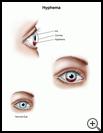
Blood in the Front of the Eye (Hyphema)
_______________________________________________________________________
KEY POINTS
- A hyphema is a pool of blood in the area between the iris, which is the colored part of your eye, and the cornea, which is the clear outer layer on the front of your eye.
- Most of the time, the blood will go away on its own. Your healthcare provider may tell you to rest with your head raised, wear an eye shield, avoid bending and strenuous activity, and use eye drops. You may need surgery to help clear the blood from the front of your eye.
________________________________________________________________________
What is a hyphema?
A hyphema is a pool of blood in the area between the iris, which is the colored part of your eye, and the cornea, which is the clear outer layer on the front of your eye. The blood can block light from reaching the back of your eye, or cause the pressure inside your eye to increase. Both of these can cause blurry vision.
If a hyphema is not treated, it can cause a permanent loss of vision.
What is the cause?
A hyphema is usually caused in one of two ways:
- Injury to your eye
- Medical problems such as diabetes, poor blood flow to your eye, and inflammation or tumors that cause abnormal blood vessels to bleed
What are the symptoms?
Symptoms may include:
- Decreased vision or blurry vision
- Eye pain or a feeling of pressure in your eye
- Painful sensitivity to light
- Blood pooled in the front of your iris
How is it diagnosed?
Your healthcare provider will ask about your symptoms and medical history and do exams and tests such as:
- An exam using a microscope with a light attached, called a slit lamp, to look closely at the front and back of your eye
- An exam using drops to enlarge, or dilate, your pupils and a light to look into the back of your eyes
- An eye pressure test, which uses a small puff of air that is blown against your open eye or a device that briefly touches your eye after it has been numbed with drops to measure the pressure inside your eye
- An ultrasound, which uses sound waves to show pictures of the back of your eye
- Blood tests to check for sickle cell trait. People with sickle cell trait or sickle cell disease have an increased risk of high eye pressure and vision loss from hyphema.
How is it treated?
Most of the time, the blood will go away on its own. Often, your healthcare provider will tell you to:
- Avoid bending and strenuous activity.
- Rest in bed with your head raised on several pillows to allow the blood to settle.
- Wear an eye shield to protect your eye.
- Use eye drops to decrease the swelling and irritation or lower pressure in your eye.
- Avoid aspirin or ibuprofen unless prescribed by your healthcare provider. Do not stop taking these medicines unless your healthcare provider tells you to do so.
You may need surgery to help clear the blood from the front of your eye. You are more likely to need surgery if:
- The blood fills the entire front of your eye.
- You have sickle cell trait or sickle cell disease.
- Your eye pressure stays high even with treatment.
- The blood in the front of your eye starts to stain the cornea
- Your eye bleeds again.
The risk for your eye bleeding again is highest in the first week after the bleeding started. If your eye does not bleed again, the hyphema will usually heal in one or two weeks, depending on how much blood is present.
How can I take care of myself?
Follow the full course of treatment your healthcare provider prescribes. Ask your healthcare provider:
- How and when you will get your test results
- How long it will take to recover
- If there are activities you should avoid and when you can return to your normal activities
- How to take care of yourself at home
- What symptoms or problems you should watch for and what to do if you have them
Make sure you know when you should come back for a checkup. You may be at risk for other eye conditions such as glaucoma even after the hyphema goes away.
How can I prevent hyphema?
- To help prevent severe eye injuries, wear safety eyewear when you:
- Do any work around the house that requires hammering, power tools, chemicals, or splatter of any kind
- Play paintball, racquetball, lacrosse, hockey, and fast-pitch softball
- Shoot firearms or use explosives of any kind
- Are in a high-risk area such as a construction site or shooting range
- Wear a seatbelt to decrease injuries from car accidents.
- Have regular eye exams, especially if you have a health condition such as diabetes.

